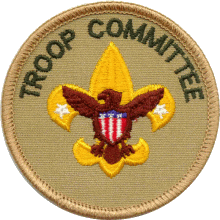Qualifications:
Is at least 21 years old, subscribes to the Declaration of Religious Principle, and agrees to abide by the Scout Oath or Promise and the Scout Law. Possesses the moral, educational, and emotional qualities that the Boy Scouts of America deems necessary to afford positive leadership to youth. Is selected by the chartered organization, and is registered as an adult leader of the BSA. One of these members is designated as troop committee chair.
Obviously, with a committee of three, members must assume responsibility for more areas of service than with a committee of seven or more, where the responsibilities can be divided among the members. Although troops can and do operate with a minimum of three committee members, experience has shown that a larger committee generally ensures a stronger, more stable troop and is better able to perform all the required functions to ensure a successful troop program. It is also a way of involving more troop families in meaningful service to the troop.
Responsibilities:
Regardless of the size of the troop committee, these responsibilities must be performed:
- Make recommendations to the chartered organization for final approval of troop leadership.
- Recruit the Scoutmaster and one or more assistant Scoutmaster, with the chartered organization’s approval.
- Provide adequate and safe facilities for troop meetings.
- Coordinate the troop’s program and the chartered organization’s program through the chartered organization representative.
- Help with troop charter renewal.
- Help stimulate the interest of adult family members through proper programming.
- Supervise finances and equipment.
- Work closely with the Scoutmaster.
- Ensure that all Scouts receive a year-round, quality program.
- Complete troop committee Fast Start Training and Basic Leader Training for the position.
- Conduct, with the help of the Scoutmaster, periodic training for parents and guardians.
- Cooperate with other Scouting units.
A strong troop committee will have individual members assigned to such areas as record keeping and correspondence, finances, advancement, training, public relations, and membership and reregistration. The troop committee chair decides how the responsibilities should be divided and gives committee members assignments.
